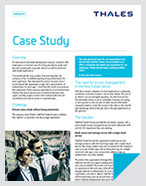Egg Bank - ViewPIN+ - Case Study
The world’s largest online bank securely issues PINs online to save money, reduce fraud, and improve the customer experience with SafeNet’s award-winning ViewPIN+ Web-based PIN management...

Code signing has emerged as an essential ingredient to doing business for virtually any organization that distributes code to customers and partners.
Code signing verifies who the publisher of a specific set of code is and attests to the fact that it has not been modified since it was signed.
Certificates delivered along with software that has been signed are a key way for users to determine whether software originates from a legitimate source before installing.
Today, many software marketplaces, including mobile app stores, require code to be compliant with specific digital signing requirements.
No matter the use case, private key security must be utilized for code signing certificates to be trusted and valued.

The world’s largest online bank securely issues PINs online to save money, reduce fraud, and improve the customer experience with SafeNet’s award-winning ViewPIN+ Web-based PIN management...

Code signing architectures are comprised of several key facets, including:
In code signing environments, a critical vulnerability exists: private keys.

Anyone who can access a legitimate certificate owner’s private key can create software that will appear to be signed by that organization.
Numerous breaches have used fraudulent code signing certificates to cause significant damage of the certificate owner’s reputation and business.
In order to effectively secure private keys used in code signing, it is vital for organizations to leverage hardware security modules (HSMs). Keys stored on servers or other systems are too susceptible to unauthorized access and compromise. Storing keys in robust, tamper-evident HSMs can eliminate these risks.

Microsoft Authenticode permits end users to identify who published a software component and verify that no one tampered with it before downloading it from the Internet.
Authenticode relies on proven cryptographic techniques and the use of one or more private keys to sign and time-stamp the published software. It is important to maintain the confidentiality of these keys.
Thales's Hardware Security Module (HSM) integrates with Microsoft Authenticode to provide a trusted system for protecting the organizational credentials of the software publisher. Thales HSMs secures the code signing key within an industry standard FIPS 140-2 Level 3 validated HSM.